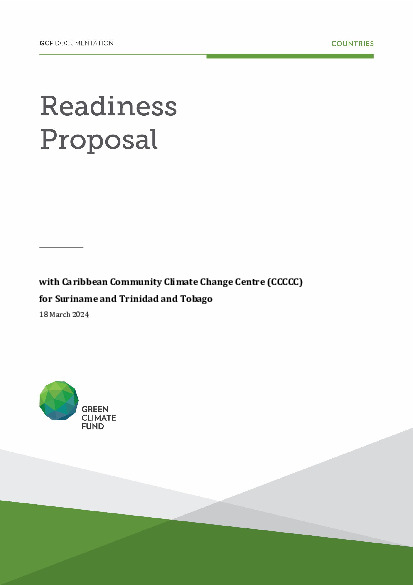Strengthening Carbon Capture Storage and Reporting Frameworks and Mechanisms

Strengthening Carbon Capture Storage and Reporting Frameworks and Mechanisms
Despite the slowing rate of increasing GHG emissions in the past decade, average GHG emissions in the last decade were the highest on record (UNEP 2022). Nevertheless, the gap between estimated total GHG emissions resulting from the full implementation of the NDCs and the total global GHG emissions from least-cost pathways will not limit global average temperature increase to below 2°C nor limit GHG emissions to 1.5°C relative to pre-industrial levels. As such, there is a need for rapid and systemic transformation to limit GHG emission in accordance with the goals of the UNFCCC. This includes augmenting public systems for capturing, monitoring, and reporting of national GHG emissions. As such this Readiness Grant request will take a bi-lateral approach to aid the Governments of Suriname and Trinidad and Tobago in (1) supporting direct access applicants (DAE) in enhance their capacity to meet and maintain the GCF’s accreditation standards (2) supporting relevant country stakeholders establish adequate systems and networks to support the planning, programming, and implementation of GCF funded activities. (3) enhancing strategic frameworks to address policy gaps, improve sectoral expertise and enhance enabling environments for GCF programming in low-emission investments. (4) establishing and operationalizing partnerships to foster development and dissemination of methods, frameworks, and information systems for enhanced climate financing programming at the national level. The approach to implementing the activities under this readiness is guided by the principle of common but differentiated responsibilities, formalized at the United Nations Framework Convention on Climate Change (UNFCCC) of Earth Summit in Rio de Janeiro, in 1992. The principle balances the need for all states to take responsibility for global climate change, with the need to recognize the differences in levels of economic development between states. As such, the respective capacities of the Suriname and Trinidad and Tobago are considered in the design of a set of country specific outputs that address common barriers preventing these countries from meeting and increasing national GHG reduction targets. These barriers include limited data, information, and technical capacity to inform decision support tools for GHG emissions reduction, reporting and quantification. These barriers are also exacerbated by limited institutional structures (i.e., coordination, human resources, & skills) and limited access to, and understanding of, systems for collecting, synthesizing and communicating information and knowledge on national GHG emission trends and the appropriate mitigation options. Further, inadequate capacities to mobilize and deploy climate finance at the national level continues to limit investments in projects and programmes aimed at reducing GHG emission. As such, the technical and institutional capacities of national and subnational government officials and staff, the private sector, non-governmental and civil society organizations, to quantify, monitor, and report on GHG emissions will be strengthen.